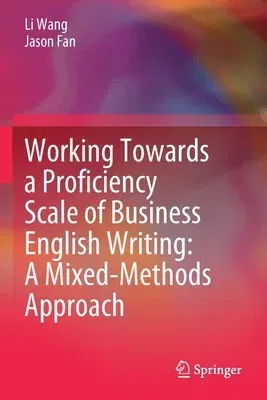1 Core Issues in Business English Education 1.1 English as a Lingua
Franca for Business Communication1.2 The Importance of Business English
Writing Skill1.3 Business English Teaching and Learning in China1.4
Problems and Challenges of Business English Education in China2
Assessment of Business English: The Role of Language Proficiency
Scales2.1 Language Proficiency Scales 2.1.1 Definitions2.1.2
Origins2.1.3 Functions2.1.4 Impact2.2 The CEFR and Business English
Tests 2.2.1 The CEFR2.2.2 Use of the CEFR2.2.3 Aligning Business English
Tests to the CEFR: Potential Problems 2.3 Scales of Business English
Proficiency: A Critical Evaluation 2.3.1 The ELTDU Stages of Attainment
Scale2.3.2 The ALTE Framework 2.3.3 The ESU Framework 2.3.4 The
International Second Language Proficiency Ratings (ISLPR)2.3.5 The
Canadian Language Benchmarks (CLB)2.3.6 Discussion3 Conceptualizing
Business English Writing Proficiency 3.1 Business English in the ESP
context3.1.1 What is ESP?3.1.2 Branches of ESP3.1.3 Categorization of
Business English3.2 Genre as ESP Writing Competence3.2.1 ESP
Conceptualization of Writing 3.2.2 The Concept of Genre 3.2.3 Genre in
Three Traditions3.2.4 Genre in the International Business World 3.3 The
Model of Genre Knowledge 3.3.1 Formal Knowledge 3.3.2 Process Knowledge
3.3.3 Rhetorical Knowledge 3.3.4 Subject-matter Knowledge4 Working
Towards a Scale of Business English Writing 4.1 General Principles of
EGP Scale Development 4.1.1 Objectivity 4.1.2 Consistency 4.1.3
Localization 4.1.4 Comparability4.2 Common Methods of Scale
Construction4.2.1 Intuitive Methods 4.2.2 Test-based Methods 4.2.3
Performance-oriented Methods4.3 Business English Writing Scale
Development: Considerations from the ESP Perspective4.3.1 Linguistic
Features of ESP 4.3.2 Pedagogical Objectives of ESP4.3.3 ESP Assessment:
Specificity and Authenticity4.4 Developing a Scale of Business English
Writing: A Mixed-Methods Approach4.4.1 Research Design 4.4.2 Scale
Development Phase4.4.3 Scale Validation Phase 5 The Initial
Establishment of a Descriptive Framework5.1 Theoretical basis of the
Business English Writing Proficiency: The Model of Genre Knowledge 5.2
Categories of Genre Knowledge from the Business English Writing
Perspective5.2.1 Operationalization of Formal Knowledge 5.2.2
Operationalization of Process Knowledge 5.2.3 Operationalization of
Rhetorical Knowledge 5.2.4 Operationalization of Subject-matter
Knowledge5.3 Categories of Business English Writing Activities5.3.1 A
Review of Genres for Business Written Communication5.3.2 Selection of
Genres for Framework Incorporation6 Creating a Descriptor Pool 6.1
Collection of Descriptors of Business English Writing Proficiency 6.1.1
Document Review6.1.2 Teacher Workshops6.1.3 Initial Categorization of
the Descriptors6.2 Refining Categories of the Descriptive Scheme6.2.1
Key Issues Raised in Category Distinctiveness6.2.2 Selection and
Revision of the Scale Categories 6.3 Quality Control on the
Descriptors6.3.1 Key Issues Raised in Descriptor Formulation 6.3.2
Selection and Revisi

